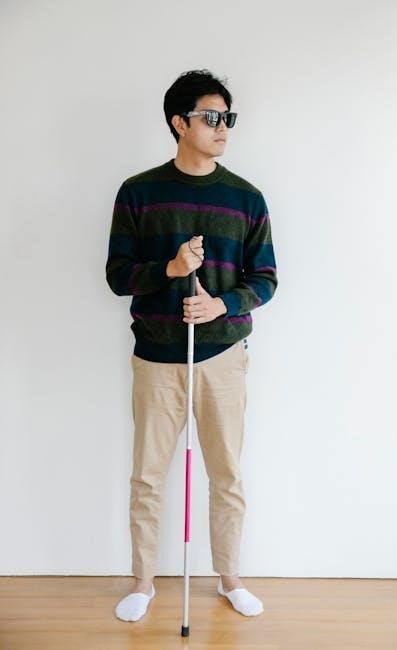Dailies Total 1 Multifocal contact lenses are designed for presbyopia, offering clear near, far, and intermediate vision․ Their Water Gradient technology ensures exceptional comfort, with nearly 100% water at the surface for a gentle, moisture-rich fit․
Key Features and Benefits of Dailies Total 1 Multifocal
Dailies Total 1 Multifocal contact lenses are designed to address the unique needs of presbyopia patients, offering exceptional comfort and clear vision at all distances․ Their innovative Water Gradient technology ensures a smooth, moisture-rich surface, with nearly 100% water at the lens surface, creating a gentle cushion for the eyes․ This design minimizes dryness and irritation, making them ideal for long-term wear․

These lenses feature an aspheric progressive design, providing a seamless transition between near, intermediate, and far vision․ The soft, breathable material (delefilcon A) enhances comfort and reduces the risk of dryness․ With a lens diameter of 14;1 mm and a base curve of 8․5 mm, they fit comfortably for most users․ The daily disposable format eliminates the need for lens care, offering unparalleled convenience and hygiene․
The Water Gradient technology also reduces lens dehydration, ensuring consistent comfort throughout the day․ Dailies Total 1 Multifocal lenses are available in three add powers (low, medium, and high), catering to a wide range of presbyopic needs․ Their advanced design and material make them a superior choice for patients seeking clear, comfortable, and hassle-free vision correction․
Understanding the Lens Design and Technology
Dailies Total 1 Multifocal contact lenses utilize cutting-edge technology to address presbyopia, combining comfort and optical precision․ Their innovative Water Gradient design features a surface with nearly 100% water, creating a gentle, moisture-rich interface for the eyes․ This unique technology minimizes dehydration and enhances comfort throughout the day․
The lenses are crafted from delefilcon A, a soft, breathable material that ensures high water content and reduces the risk of dryness․ The aspheric progressive design provides a seamless transition between near, intermediate, and far vision, minimizing optical aberrations and delivering sharp, clear imagery at all distances․
The Water Gradient technology not only improves comfort but also supports the lens’s optical performance by maintaining surface moisture․ With a lens diameter of 14․1 mm and a base curve of 8․5 mm, Dailies Total 1 Multifocal lenses are designed to fit comfortably while addressing the specific needs of presbyopic patients․ This advanced design ensures a natural wearing experience, making them an excellent choice for daily disposable multifocal correction․
The Fitting Process
The fitting process for Dailies Total 1 Multifocal involves a structured approach, starting with an initial assessment and patient selection․ Key steps include power selection, add power considerations, trial lens fitting, and fine-tuning for optimal vision and comfort․
4․1 Initial Assessment and Patient Selection

The initial assessment for fitting Dailies Total 1 Multifocal lenses begins with evaluating the patient’s specific needs and ocular health․ Key considerations include the presence of presbyopia, pupil size, and the patient’s lifestyle․ A thorough eye examination is conducted to assess visual acuity, refractive error, and binocular vision․ The practitioner also evaluates the patient’s tear film and corneal health to ensure compatibility with the lens material․ Patient selection criteria include individuals with presbyopia, those who require correction for near, intermediate, and far vision, and those seeking convenient daily disposable lenses․ Additionally, patients must demonstrate good hygiene practices and willingness to follow proper lens care instructions․ The initial assessment also involves discussing expectations and addressing any concerns to ensure a successful fitting experience․ By carefully selecting suitable candidates, eye care professionals can maximize the likelihood of a positive outcome with Dailies Total 1 Multifocal lenses․
4․2 Power Selection and Add Power Considerations
Power selection for Dailies Total 1 Multifocal lenses is critical to ensure optimal vision at all distances․ The fitting guide recommends starting by adding 0․25D to the patient’s prescription for the initial trial lens selection․ This approach helps maximize comfort and clarity․ The lenses are available in three ADD powers—low (LO), medium (MED), and high (HI)—to accommodate varying degrees of presbyopia․ The near and intermediate powers are calculated based on the selected ADD power, ensuring a smooth transition between focal points․ Practitioners should begin with distance refraction and gradually adjust in 0․25D steps, prioritizing plus acceptance to maintain clear distance vision․ The Water Gradient technology enhances comfort while maintaining optical precision․ Proper power selection and ADD considerations are essential for addressing the patient’s unique visual needs and ensuring satisfaction with the multifocal correction․ By following the fitting guide, eye care professionals can optimize the lens performance for each patient․
4․3 Trial Lens Fitting and Handling
The trial lens fitting process for Dailies Total 1 Multifocal involves evaluating the lens performance on the patient’s eyes․ Start with the calculated power and ADD based on the initial assessment․ Use hand-held trial lenses to assess distance, intermediate, and near vision․ Begin with distance refraction, adding plus in 0․25D steps until the patient reports a decline in distance vision․ This ensures optimal plus acceptance and clarity․ Monitor the patient’s visual acuity at all distances and make adjustments as needed․ Proper handling of the trial lenses is crucial; ensure they are clean and free from debris before application․ Patients should be instructed on how to insert and remove the lenses correctly to avoid discomfort or damage․ Assess the lens fit and movement, ensuring centration and adequate tear exchange․ The fitting guide emphasizes the importance of patient feedback during this step to fine-tune the lens selection for optimal vision and comfort․ This hands-on approach ensures a successful trial and sets the foundation for a satisfactory fitting outcome․
4․4 Fine-Tuning the Fit for Optimal Vision
Fine-tuning the fit of Dailies Total 1 Multifocal lenses is essential for achieving optimal vision and comfort․ After the initial trial, adjustments may be needed to refine the power, ADD, or lens centration․ Patient feedback is critical at this stage, as it guides the practitioner in making precise modifications․ If distance vision is compromised, consider reducing the plus power in 0․25D increments․ For near vision issues, increasing the ADD power may be necessary․ The lens’s design, with its aspheric progressive profile, allows for customization to meet individual visual needs․ Ensure proper centration by assessing lens movement and tear exchange․ The fitting guide recommends verifying the patient’s visual acuity at all distances and making adjustments accordingly․ Fine-tuning also involves addressing any comfort concerns, leveraging the lens’s water gradient technology for enhanced comfort․ By carefully refining the fit, practitioners can ensure a seamless transition for presbyopic patients, delivering clear vision and all-day comfort․ This step is pivotal in maximizing patient satisfaction and achieving a successful fitting outcome․

Patient Education and Communication
Patient education and communication are vital for the successful adaptation of Dailies Total 1 Multifocal lenses․ Clear communication helps set realistic expectations and ensures patients understand the benefits and potential adjustments needed․ Practitioners should explain how the lenses work, emphasizing their ability to correct presbyopia without the need for reading glasses․ Demonstrating proper insertion and removal techniques is essential, as is highlighting the convenience of daily disposability․ Patients should be informed about the Water Gradient technology, which enhances comfort, and the importance of proper hygiene to maintain eye health․ Addressing common concerns, such as initial adaptation period or potential visual fluctuations, can alleviate anxiety․ Encourage patients to report any issues promptly and schedule follow-ups to monitor progress․ Effective communication builds trust and ensures patients are confident in their new lenses, leading to a positive experience and long-term satisfaction with Dailies Total 1 Multifocal․ This step is crucial for fostering a strong patient-practitioner relationship and ensuring optimal outcomes․

Follow-Up Care and Schedule

Regular follow-up care is essential to ensure optimal performance and comfort with Dailies Total 1 Multifocal lenses․ Schedule an initial follow-up within 1-2 weeks after the fitting to assess adaptation and address any issues․ During this visit, evaluate visual acuity at all distances, check lens centration, and monitor comfort․ Patients may need time to adapt to the multifocal design, so be prepared to fine-tune the fit if necessary․ Subsequent follow-ups should occur at 3-6 months and annually thereafter to maintain eye health and ensure continued satisfaction․ Emphasize the importance of adhering to the daily disposable schedule to prevent complications․ Use these appointments to reinforce proper hygiene practices and address any emerging concerns․ Consistent follow-up care ensures long-term success with Dailies Total 1 Multifocal lenses, supporting both visual clarity and eye health for presbyopic patients․ This structured approach helps build patient trust and ensures a positive, ongoing experience with their contact lenses․ Regular monitoring is key to achieving the best possible outcomes․

Troubleshooting Common Fitting Issues
When fitting Dailies Total 1 Multifocal lenses, several common issues may arise․ One frequent concern is poor centration, leading to inconsistent vision․ This can often be resolved by ensuring proper lens handling and verifying the correct base curve․ Another issue is insufficient near or intermediate vision, which may require adjusting the add power or refining the power selection․ Some patients might experience discomfort due to the unique water gradient design, but this typically subsides with adaptation․ If comfort issues persist, consider verifying the lens parameters or assessing the ocular surface․ Additionally, if a patient reports difficulty transitioning between near and far vision, fine-tuning the fit or exploring alternative add powers may be necessary․ Regular follow-ups and open communication with patients are crucial to address these challenges promptly․ By systematically identifying and resolving these issues, eye care professionals can enhance patient satisfaction and ensure optimal outcomes with Dailies Total 1 Multifocal lenses․ Proper troubleshooting ensures a smooth adaptation process for presbyopic patients․
Resources and Manufacturer Support
Alcon provides comprehensive resources and support for eye care professionals fitting Dailies Total 1 Multifocal lenses․ The official Fitting Guide is a key resource, offering detailed instructions for initial assessments, power selection, and troubleshooting․ Additionally, technical specifications, product inserts, and patient instruction booklets are available for download on Alcon’s website․ These materials ensure accurate and successful lens fitting, enhancing patient satisfaction․ Alcon also offers customer support through dedicated helplines and online platforms, providing assistance with any questions or concerns․ Furthermore, Alcon regularly updates its website with the latest clinical data, case studies, and training programs to help professionals master the fitting process․ By leveraging these resources, eye care professionals can confidently fit Dailies Total 1 Multifocal lenses, ensuring optimal outcomes for presbyopic patients seeking convenient, daily disposable multifocal correction․